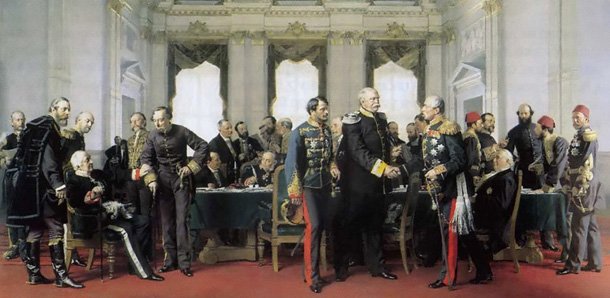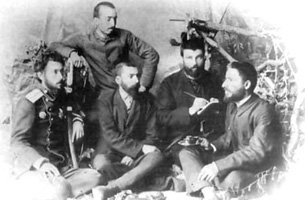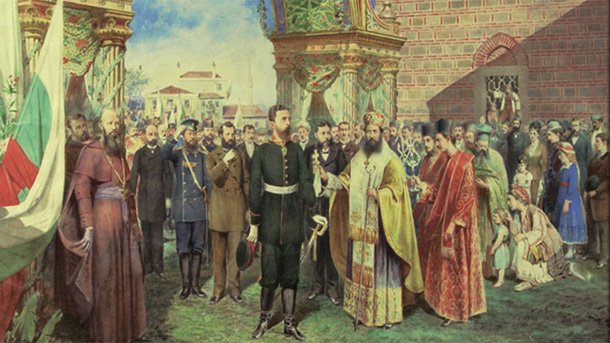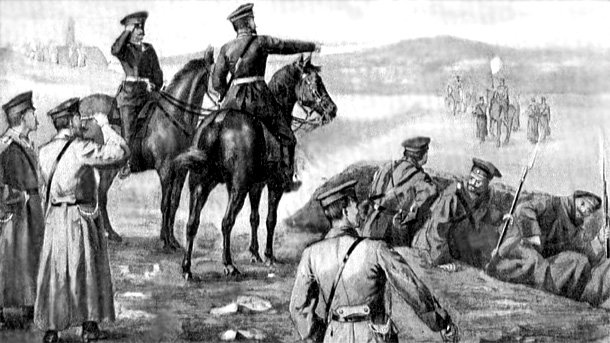On 6th September 1885 one of the most inspiring events in Bulgaria’s modern history took place, the Unification of the Principality of Bulgaria and Eastern Romelia. It occurred seven years after the Liberation of the country from Ottoman rule resulting from the Russo-Turkish War in 1877-1878. The war ended with the signing of a treaty in San Stefano, not far from Istanbul. Under that treaty lands with predominantly Bulgarian population were included in the young Bulgarian state. However several months after the signature of the treaty the Berlin Congress controlled by the Great Powers, partitioned those lands into five parts.

© Photo: archive
The biggest chunks were the Principality of Bulgaria (Northern Bulgaria plus the Region of Sofia), and Eastern Rumelia, the present-day southern Bulgaria that however was given the status of an autonomous province of the Ottoman Empire. This failure of the ideals of the Bulgarian national-liberation struggles implied that the Bulgarians had to continue fighting for the unification of the Principality with the province.
We bring you more details in an interview with Academician Georgi Markov. We asked the renowned historian whether the act of Unification was elaborated in diplomatic terms and in terms of the domestic affairs?

“The Bulgarian Prince Alexander I Battenberg was naturally keen on Unification, but he wanted to delay the act in time, so as to give more time to its diplomatic elaboration. At that time Russia, in the person of Tsar Alexander III, opposed the Unification. This was a paradox, because the Berlin Congress had harmed Russia’s interests, while now it opted for backing the status quo. Germany led by Chancellor Bismarck opposed Bulgaria’s Unification too. The Bulgarian Prince Alexander I had fears that such an act could end up in a mess and the Ottoman Empire could use the occasion to move troops into Eastern Rumelia. However the domestic Unification movement through the Unity Committees, the Bulgarian Clandestine Central Revolutionary Committee chaired by revolutionary, politician and writer Zahary Stoyanov and the Bulgarian troops in Eastern Rumelia, all backed the Unification and decided that the sacral act should no longer be delayed.”
What was the role of Zahary Stoyanov in preparing the Unification?

© Photo: archive
“Zahary Stoyanov embodied the continuity of the national-liberation struggles before and after the War of Liberation. He had accumulated revolutionary experience in the 1870s. Zahary Stoyanov and Ivan Andonov were very active in creating local committees and in arming detachments that had to support the military. In fact, the Unification was a most powerful cause, because all parties in the Principality of Bulgaria, both Russo-phile or Austro-phile, supported it openly, while on the other hand, the people of Eastern Rumelia were unanimous that the Bulgarians to the north and south of the Balkan Range should not be divided. They were aware that they had to unite and present the Great Powers with a fiat accompli. And this did happen. Of course, this was also a risky effort but things changed in the summer of 1885. While Russia opposed Bulgaria’s unification, Great Britain, a major opponent of a large Bulgaria under the defunct San Stefano Treaty, surprisingly backed the Unification. And it was Britain that deterred the Ottoman Empire from military intervention in Eastern Rumelia.”
One of the declarations for the Unification reads that it should be conducted in “a most noble of ways”, i.e. bloodlessly, in a civilized manner. Was this one of the reasons for its success?
“Yes, definitely. Prince Alexander issued a manifesto for the Unification stating explicitly that the new Bulgarian authority in the former Eastern Rumelia would regard the rights of all: of the Bulgarian majority, but also the rights of the ethnic minorities including Turks, Armenians, Jews and Greeks. For this reason there was no resistance to Unification on behalf of the non-Bulgarian population in the province. The Balkan countries did not intervene either. Unfortunately shortly after Unification, the Serbian King Milan spoke up for ‘Balkan balance’ and Serbia declared a war on Bulgaria. Other countries, more notably the Ottoman Empire, saw no reason to intervene in Eastern Rumelia.”

© Photo: muzeini-relikvi.net
How much did the victory of Bulgaria in the Serbo-Bulgarian War of 1885 contribute to the recognition of Unified Bulgaria?
“This victory was decisive, because King Milan had attacked Bulgaria for the sake of the Balkan status quo and balance with a mandate extended by part of the Great Powers. So, had the Serbian army succeeded in entering Sofia, the territorial status quo would have been restored. But then, as a few West European newspapers wrote, ‘the young Bulgarian army worked a wonder in the battle at Slivnitsa.’ The victory over the Serbian army legitimized the Unification. Now the Great Powers could see that a new and powerful state was emerging at the heart of the Balkans – the Bulgarian state which, as Bismarck put it, had a major role to play in the settlement of the Eastern Question.”

© Photo: archive
What were the political and economic benefits from the 1885 Unification of Bulgaria?
“With the merging of the Principality of Bulgaria with Eastern Rumelia, more favorable conditions were created for the development of industry. True, Austria-Hungary kept its ownership of the Eastern Railways in Southern Bulgaria until 1908, however new, auspicious conditions emerged for building factories and railroads. In political terms Bulgaria improved her image. Though the country was formally tributary to the sultan in Istanbul until 1908 when it declared its independence, Bulgaria was already an autonomous factor in Southeast Europe that both neighbors and the Great Powers had to account for”, concludes historian Georgi Markov.
Translated by Daniela Konstantinova
On 20 April, all Christians will celebrate the Resurrection of Christ. Against the backdrop of our divided and troubled world, Catholics, together with Orthodox Christians, Armenians and Protestants, will send a message of hope and share the joy of the..
Holy Saturday services begin on Friday evening with Vespers. The Church commemorates the burial of Christ the Saviour and His descent into hell to save the righteous who had died before His work of redemption. Joseph of Arimathea and Nicodemus, with..
On Good Friday, the saddest day for Christians, the liturgy commemorates the suffering, crucifixion and death of Jesus Christ, who sacrificed himself for the guilt and sins of humanity. The service at the Metropolitan Cathedral "St. Nedelya" in..
In 2025, the Catholic and Orthodox churches celebrate Easter on April 20. It is more joyful when we celebrate the Resurrection of Christ together...
On 20 April, all Christians will celebrate the Resurrection of Christ. Against the backdrop of our divided and troubled world, Catholics, together with..
On Good Friday, the saddest day for Christians, the liturgy commemorates the suffering, crucifixion and death of Jesus Christ, who sacrificed..

+359 2 9336 661
